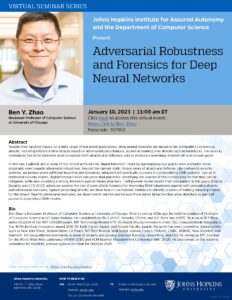Abstract: Despite their tangible impact on a wide range of real world applications, deep neural networks are known to be vulnerable to numerous attacks, including inference time attacks based on adversarial perturbations, as well as training time attacks such as backdoors. The security community has done extensive work to explore both attacks and defenses, only to produce a seemingly endless cat-and-mouse game. In this talk, I will talk about some of our recent work into ML digital forensics. I start by summarizing our goal to seek a broader, more pragmatic view towards adversarial robustness, beyond the current static, binary views of attack and defense. Like real world security systems, we believe given sufficient incentive and resources, attackers will eventually succeed in compromising DNN systems. Just as in traditional security realms, digital forensics tools can serve dual purposes: identifying the sources of the compromise so that they can be mitigated, while also providing a strong deterrent against future attackers. I will present recent results from two papers in this space (Usenix Security and CCS 2022), where we explore the role of post-attack forensics for improving DNN robustness against both poisoning attacks and adversarial examples. Against poisoning attacks, we show how to use forensic evidence to identify subsets of training data responsible for the attack. Against adversarial examples, we show how to survive and recover from server breaches that allow attackers to gain full access to proprietary DNN models.
Bio: Ben Zhao is Neubauer Professor of Computer Science at University of Chicago. Prior to joining UChicago, he held the position of Professor of Computer Science at UC Santa Barbara. He completed his Ph.D. at U.C. Berkeley (2004), and B.S. from Yale (1997). He is an ACM Fellow, and a recipient of the NSF CAREER award, MIT Technology Review’s TR-35 Award (Young Innovators Under 35), ComputerWorld Magazine’s Top 40 Technology Innovators award, IEEE ITC Early Career Award, and Google Faculty awards. His work has been covered by media outlets such as New York Times, Boston Globe, LA Times, MIT Tech Review, Wall Street Journal, Forbes, Fortune, CNBC, MSNBC, New Scientist, and Slashdot. He has published extensively in areas of security and privacy, machine learning, networking, and HCI. He served as TPC (co)chair for the World Wide Web conference (WWW 2016) and ACM Internet Measurement Conference (IMC 2018). He also serves on the steering committee for HotNets, and was general co-chair for HotNets 2020.
